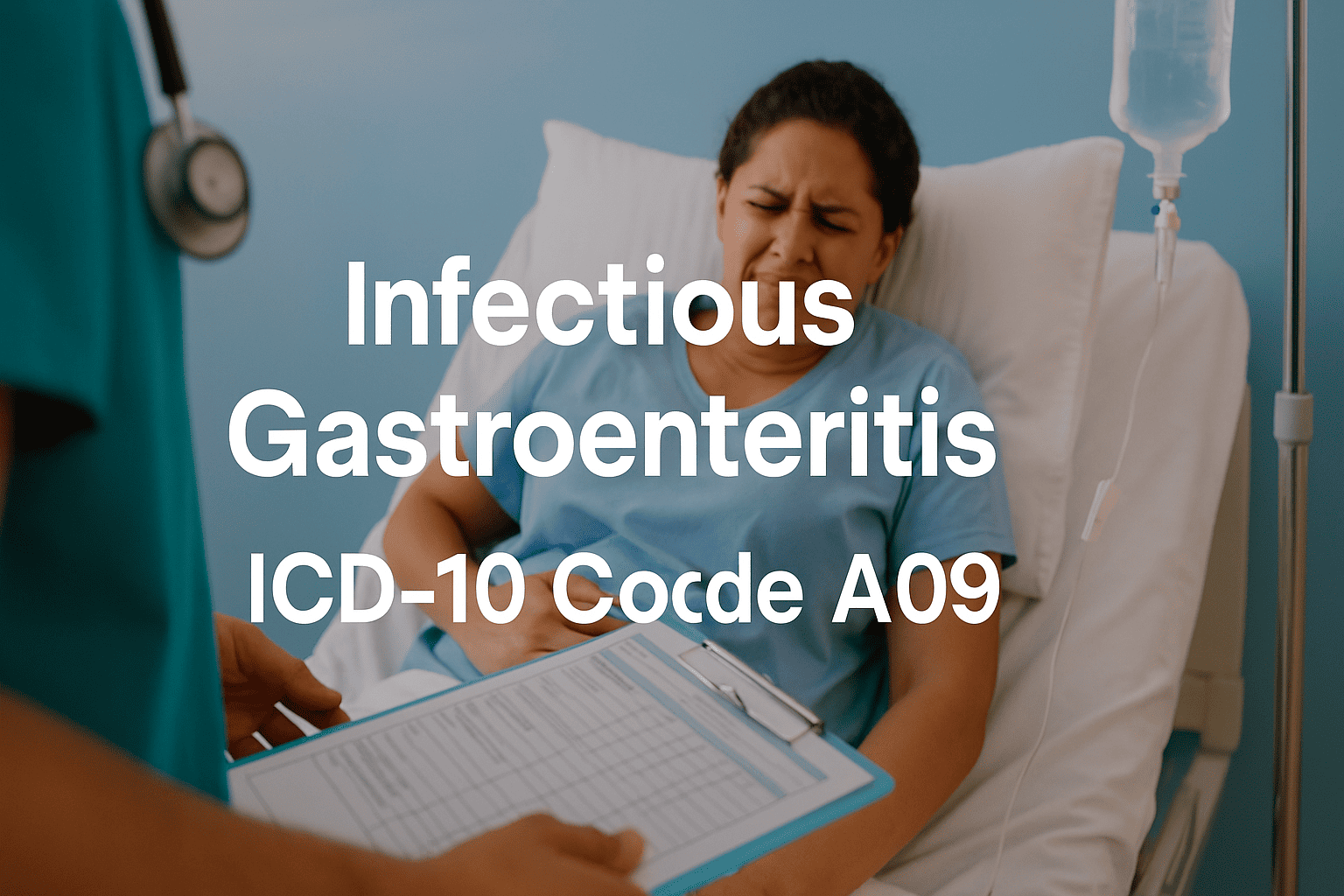Updated on: July 23, 2025
Infectious gastroenteritis is an inflammation of the gastrointestinal tract caused by viral, bacterial, or parasitic pathogens. It typically manifests with diarrhea, vomiting, abdominal cramps, and dehydration. The condition is common across all age groups and can range from mild to severe, especially in vulnerable populations like infants and the elderly.
ICD-10 Code: A09 — What It Means
ICD-10 Code A09 is used when the specific pathogen causing the gastroenteritis is not identified. It covers:
-
Unspecified infectious gastroenteritis
-
Unspecified infectious colitis
-
Enteritis NOS
-
Infective diarrhea NOS
Note: If the pathogen is known (e.g., norovirus, E. coli, salmonella), a more specific ICD-10 code should be used instead (e.g., A04.7 for enterocolitis due to Clostridium difficile).
Clinical Symptoms of Infectious Gastroenteritis
Common signs include:
-
Acute or chronic diarrhea
-
Vomiting or nausea
-
Fever and chills
-
Stomach pain or cramping
-
Dehydration (dry mouth, low urine output)
-
Fatigue and weakness
Proper documentation of these symptoms is essential to justify coding under A09 when a specific cause is undiagnosed.
Causes and Transmission
Though A09 is a broad diagnosis, it is often due to:
-
Viral infections: Norovirus, Rotavirus (especially in children), Adenovirus
-
Bacterial infections: Campylobacter, E. coli, Shigella (when undiagnosed)
-
Contaminated food or water
-
Poor sanitation or hand hygiene
Diagnostic Methods
Before assigning A09, clinicians typically perform:
-
Patient history (recent travel, food intake, outbreak exposure)
-
Stool sample tests (if symptoms persist or are severe)
-
Physical examination for dehydration and abdominal findings
If testing reveals a known cause, coders must choose a more specific code.
ICD-10 Documentation Tips for A09
When documenting for ICD-10 code A09, make sure to include:
-
Absence of identifiable organism (e.g., “etiology unknown”)
-
Duration and severity of symptoms
-
Presence or absence of dehydration
-
Any complications such as electrolyte imbalance
-
If the case is community-acquired or hospital-acquired
Example of Good Documentation:
“Patient presents with acute onset of watery diarrhea, abdominal cramping, and mild dehydration. No known pathogen identified at time of visit. Presumed viral gastroenteritis. Supportive treatment recommended.”
When to Use Other Codes Instead of A09
| Pathogen Identified | Use This ICD-10 Code |
|---|---|
| Clostridium difficile | A04.7 |
| Norovirus or Rotavirus | A08.4 or A08.0 |
| E. coli (Enteropathogenic) | A04.0 |
| Cholera | A00.9 |
Avoid using A09 if lab results specify the organism.
Treatment & Care Workflow
Most cases coded under A09 are managed with:
-
Oral rehydration therapy (ORT)
-
Antiemetics and antidiarrheals
-
Probiotics (optional, based on guidelines)
-
IV fluids in severe dehydration
-
Isolation protocols in case of outbreaks
Documentation of these interventions also supports the use of A09 and informs billing and reimbursement processes.
Role of Virtual Medical Scribes in A09 Documentation
Using AI-powered solutions like DocScrib’s Virtual Medical Scribe can significantly improve documentation quality for infectious conditions like A09. Clinicians can:
-
Automatically transcribe patient encounters
-
Flag missing clinical elements
-
Get real-time ICD-10 code suggestions
-
Ensure documentation supports medical necessity for billing
👉 Learn more about how DocScrib improves clinical documentation →
Reimbursement Considerations
A09 is often billed as a primary diagnosis in urgent care, outpatient clinics, or ER settings. Accurate documentation ensures:
-
Proper E/M code pairing
-
Eligibility for insurance reimbursement
-
Justification for diagnostic testing and treatment
Warning: Vague documentation like “diarrhea” without stating “infectious” may lead to downcoding.
Frequently Asked Questions
Can A09 be used if the patient tests negative for all pathogens?
Yes, A09 is appropriate when the condition appears infectious, but no pathogen is identified.
What if the patient has both vomiting and diarrhea?
If no specific cause is known, A09 is valid. Additional symptom codes (like R11.10 for nausea) may also be used.
Is A09 appropriate for food poisoning?
If the specific foodborne pathogen is unknown, A09 can be used. Otherwise, use specific codes like A05.9.
Conclusion
ICD-10 Code A09 serves as a catch-all for infectious gastroenteritis cases when the causative agent is unknown. However, accurate and detailed documentation is critical to avoid coding errors, ensure appropriate treatment, and receive full reimbursement. Leveraging tools like DocScrib can help reduce clinician burden and improve coding precision in high-volume practices.
Ready to optimize your clinical workflow with AI scribe support?
👉 Book a free demo with DocScrib today
